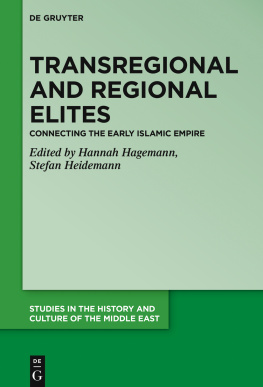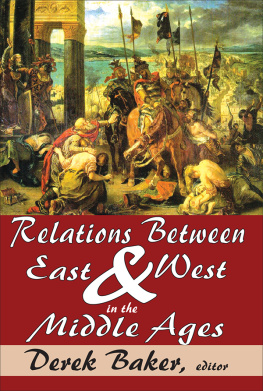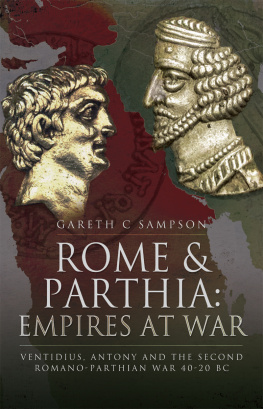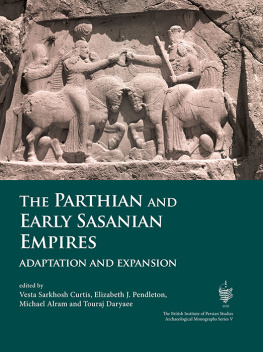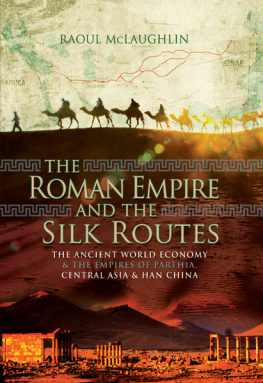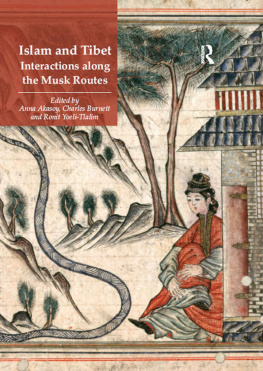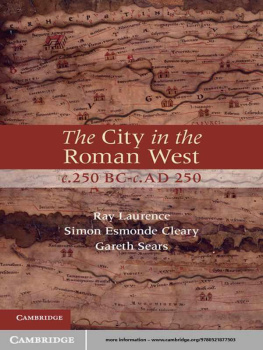Arsacids, Romans, and Local Elites
Arsacids, Romans, and Local Elites
Cross-Cultural Interactions of the Parthian Empire
edited by
Jason M. Schlude
and
Benjamin B. Rubin
Oxford & Philadelphia
Published in the United Kingdom in 2017 by
OXBOW BOOKS
The Old Music Hall, 106108 Cowley Road, Oxford OX4 1JE
and in the United States by
OXBOW BOOKS
1950 Lawrence Road, Havertown, PA 19083
Oxbow Books and the individual contributors 2017
Paperback Edition: ISBN 978-1-78570-592-2
Digital Edition: ISBN 978-1-78570-593-9
Mobi Edition: ISBN 978-1-78570-594-6
A CIP record for this book is available from the British Library
Library of Congress Cataloging-in-Publication Data
Names: Schlude, Jason M., editor, author. | Rubin, Benjamin B., editor, author.
Title: Arsacids, Romans, and local elites : cross-cultural interactions of the Parthian Empire / edited by Dr. Jason M. Schlude, College of Saint Benedict and Saint Johns University and Dr. Benjamin B. Rubin, Williams College.
Description: Oxford ; Havertown, PA : Oxbow Books, 2017. | Includes bibliographical references.
Identifiers: LCCN 2017002720 (print) | LCCN 2017007928 (ebook) | ISBN 9781785705922 (pbk.) | ISBN 9781785705939 (epub) | ISBN 9781785705946 (mobi) | ISBN 9781785705953 (pdf)
Subjects: LCSH: Arsacid dynasty, 247 B.C.-224 A.D. | Parthians--History. | Iran--Social life and customs. | Iran--History--To 640.
Classification: LCC DS285 .A77 2017 (print) | LCC DS285 (ebook) | DDC 939/.6--dc23
LC record available at https://lccn.loc.gov/2017002720
All rights reserved. No part of this book may be reproduced or transmitted in any form or by any means, electronic or mechanical including photocopying, recording or by any information storage and retrieval system, without permission from the publisher in writing.
For a complete list of Oxbow titles, please contact:
| UNITED KINGDOM | UNITED STATES OF AMERICA |
| Oxbow Books | Oxbow Books |
| Telephone (01865) 241249, Fax (01865) 794449 | Telephone (800) 791-9354, Fax (610) 853-9146 |
| Email: | Email: |
| www.oxbowbooks.com | www.casemateacademic.com/oxbow |
Oxbow Books is part of the Casemate Group
Front cover: Arch of Severus Septimus, Rome. Jean-Christophe Benoist. AR drachma. Mithradates I. Hecatompylos. Sellwood 1980: type 7.1. Sunrise Collection (U. S. A).
List of Contributors
D R . B JRN A NDERSON
Assistant Professor
School of Art and Art History
University of Iowa
210 Art Building West
Iowa City, IA 52242
U. S. A.
D R . P ETER E DWELL
Senior Lecturer
Department of Ancient History
Macquarie University
Building W6A 516
NSW, 2109
Australia
D R . K ENNETH R. J ONES
Associate Professor of History and Classics
Department of History
Baylor University
One Bear Place #97306
Waco, TX 76798-7306
U. S. A.
D R. J EFFREY D. L ERNER
Professor
Department of History
Wake Forest University
Tribble Hall B-101
1834 Wake Forest Road
Winston-Salem, NC 27106
U. S. A.
D R. J AKE N ABEL
Graduate Student in Classics
Department of Classics
Cornell University
120 Goldwin Smith Hall
Ithaca, NY 14853-3201
U. S. A.
D R. J. A NDREW O VERMAN
Harry M. Drake Distinguished Professor
in the Humanities and Fine Arts
Department of Classics
Macalester College
Old Main 313
1600 Grand Ave.
St. Paul, MN 55105
U. S. A.
D R. B ENJAMIN B. R UBIN
Assistant Professor of Classics
Department of Classics
Williams College
85 Mission Park Dr.
Williamstown, MA 01267
U. S. A.
D R. J ASON M. S CHLUDE
Assistant Professor of Classics
Department of Languages and Cultures
College of Saint Benedict and Saint Johns
University
Quad 255A
Collegeville, MN 56321
U. S. A.
Acknowledgments
The process of showing gratitude is always a joyful enterprise. So it is with happy appreciation that on behalf of the contributors to this volume we wish to recognize those who have supported the various stages of research, presentation, writing, and publication that have led to its realization. Firstly, we wish to thank the programming committee of the American Schools of Oriental Research (ASOR). The members of that committee approved a three-year panel on the Parthian empire between 2012 and 2014 that provided us with an opportunity to pursue the subject and present our findings at the annual meeting of ASOR. We are entirely grateful to Dr. Julie Gardiner of Oxbow Books who expressed interest early on in the publication of this research and has been entirely patient and supportive as the project has come together. We wish to acknowledge the organizations and individuals who gave permission for our publication of photographs from their collections, including the American Numismatic Society, Classical Numismatic Group, Ars Numismatica Classica, Sunrise Collection, Mediterranean Coins, Dr. G. R. Assar, and Francesco Bini. Finally, we thank our readers those who would invest their time in studying the fascinating history of the ancient Near East in the time of the Parthian empire, a worthy subject indeed.
J. M. S.
B. B. R.
Introduction
Jason M. Schlude
This volume is the product of several years of research, presentation, discussion, and writing by a group of scholars on the subject of the Arsacid dynasty of Parthia and its interactions with neighboring states, both small and large. Each of the following chapters was originally delivered as a part of a panel devoted to Parthia at the annual meeting of the American Schools of Oriental Research in 2012, 2013, and 2014. Let us say from the outset how much we appreciate that the authors in this volume (and other scholars beyond them) accepted the invitation to contribute to those discussions. It proved a good opportunity to advance each of our understandings of the Parthian empire, as well as to engage other interested parties in the subject. And it is our hope now that those who have subjected themselves to the added toil of revising and expanding their pieces, or even of writing an entirely new piece, as was sometimes the case, for this volume will further the study of Parthia in a more formal, substantial, and effective way.
Scholars have invested a great deal of energy in reconstructing the narrative of Parthian history, especially its relationship with the Roman empire. This effort is understandable and necessary. Our information on Parthia is scattered and uneven, and our narrative is primarily based on the Graeco-Roman source tradition. but Debevoise remains valuable.
Such scholars have laid a foundation that has permitted others to investigate particular aspects of Parthian history, including the potential of the evidence to speak to more focused, thematic problems. For example, scholars have explored what could be called intercultural communication. They have pursued how Arsacid kings and their subjects interacted with other peoples outside the Parthian empire. In this way, many have addressed squarely the confrontation of Rome and Parthia, and they have done so from various angles. Particularly superb among this latter class is Ziegler, who considers Roman-Parthian relations, and the conflicts that were a part of them, in the context of international law.


